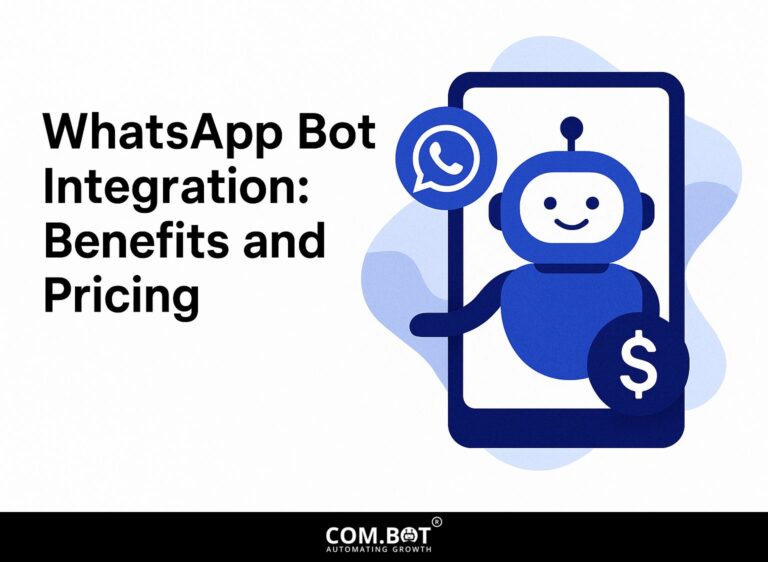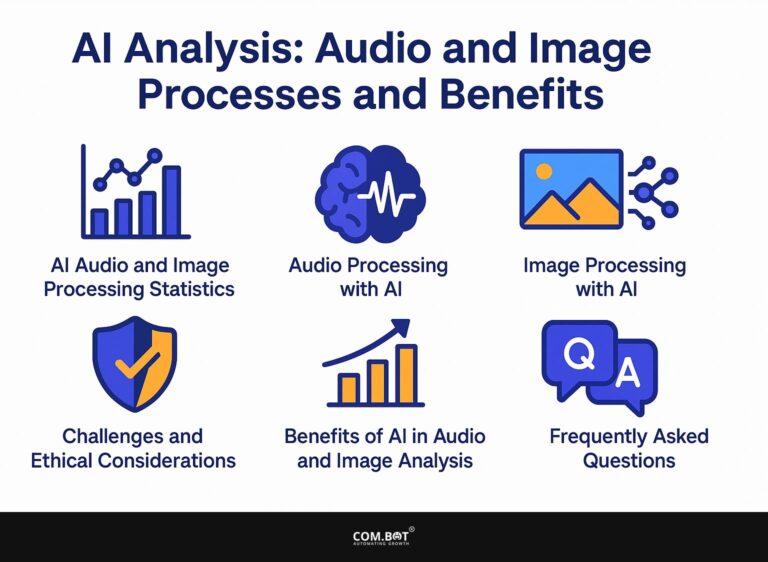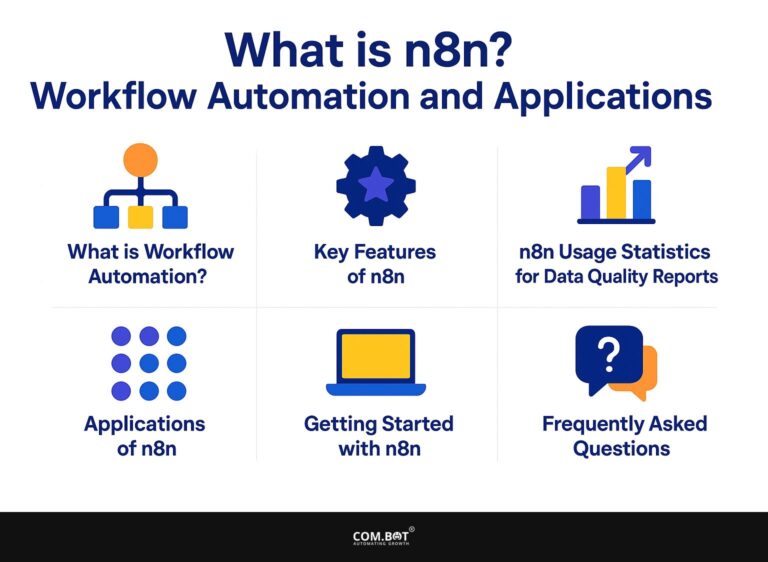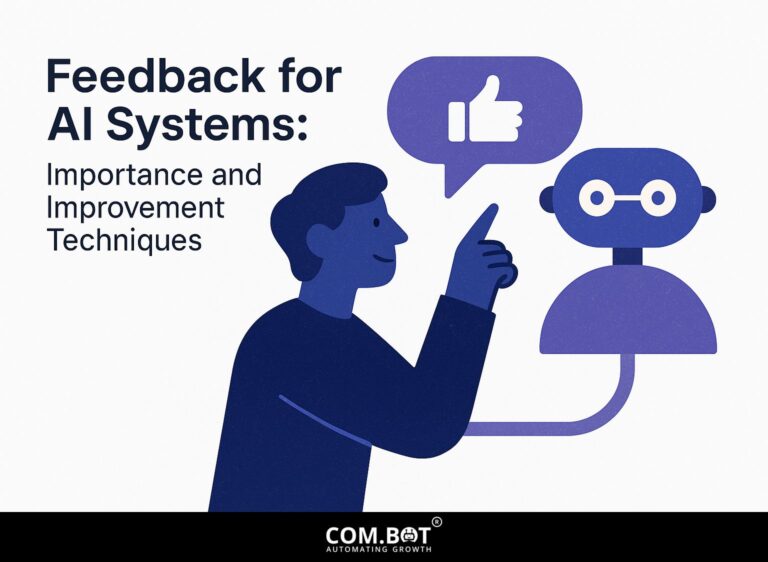Booking and Reservation Bots: Use Cases and Benefits
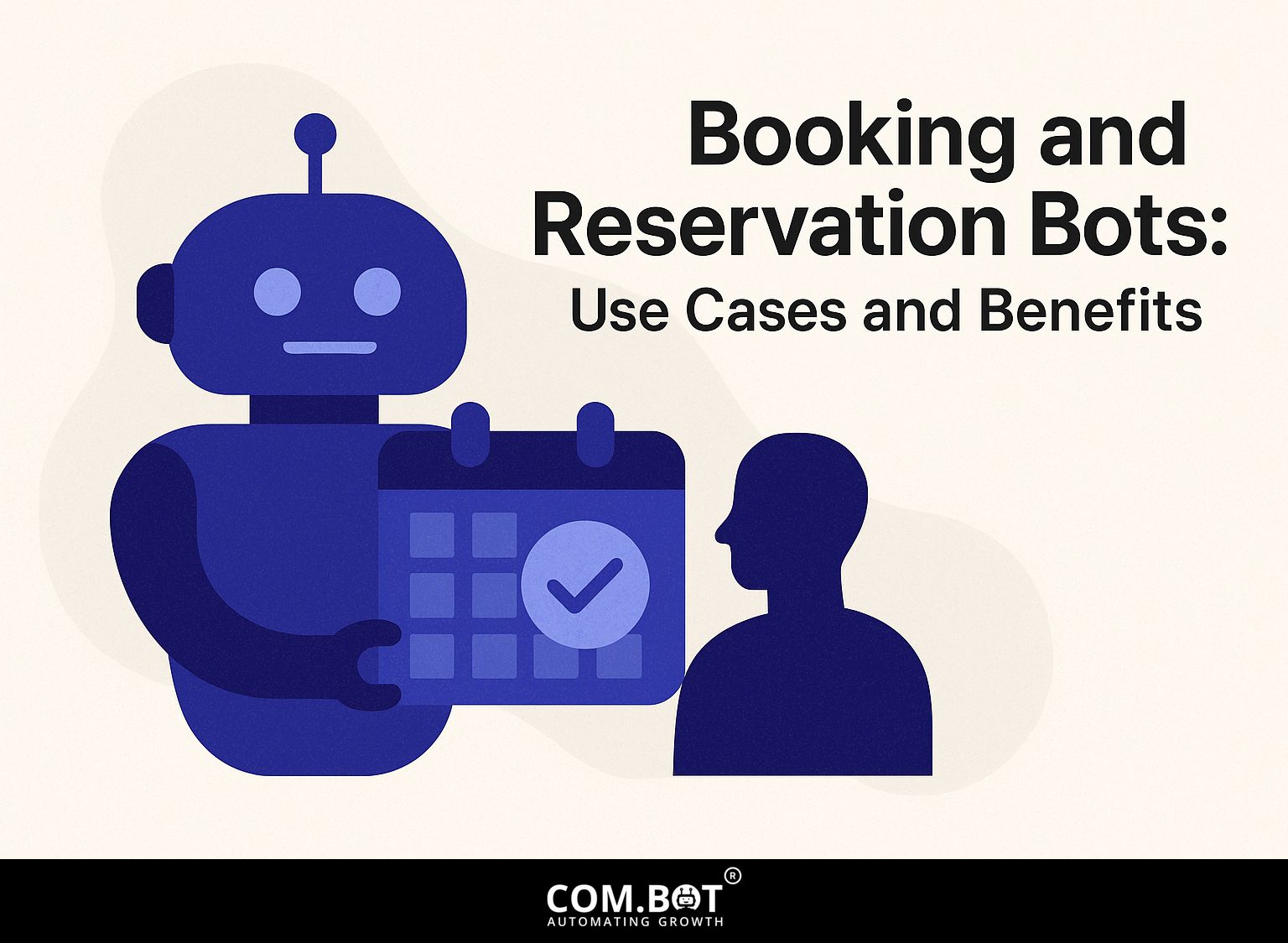
In today’s fast-paced travel industry, booking and reservation bots are revolutionizing customer experience. These AI tools, like Zoho SalesIQ, work as virtual assistants, making the process easier for travelers and improving service efficiency. This article looks at the different ways chatbots are used in travel and the benefits they bring. It explains how chatbots improve operations and provide an easy booking process for customers. Find out how using these new ideas can improve your business.
Key Takeaways:
- Booking and reservation bots are always available, improve efficiency, and save money for businesses today.
- They have various use cases in the travel and hospitality industry, event management, and restaurant reservations.
- Booking and reservation bots will use AI and machine learning to better tailor experiences and enhance user engagement.
- 1 Use Cases of Booking and Reservation Bots
- 2 Booking Bot Statistics 2024
- 3 Benefits of Implementing Bots
- 4 Challenges and Considerations
- 5 Upcoming Developments in Booking and Reservation Bots
- 6 Frequently Asked Questions
- 6.1 1. What are booking and reservation bots and how do they work?
- 6.2 2. What are some possible use cases for booking and reservation bots?
- 6.3 3. What are the benefits of using booking and reservation bots?
- 6.4 4. Can booking and reservation bots handle complex or unique requests?
- 6.5 5. Do booking and reservation bots have the ability to handle multiple languages?
- 6.6 6. Can booking and reservation bots integrate with other systems and platforms?
1. Definition and Overview
Chatbot technology in booking and reservation bots makes it easy for customers to interact with service providers, simplifying the booking process.
These bots can handle various functionalities, enhancing user experience. They handle customer questions at any time, quickly providing information on availability, menu choices, or service specifics.
They facilitate bookings by integrating with calendar systems to show real-time availability, allowing users to secure appointments without human intervention. Related insight: Appointment Scheduling with AI Bots: Best Practices
Tools like ManyChat and Chatfuel are popular for creating such bots, enabling easy integration with platforms like Facebook Messenger. By using these technologies, businesses can decrease missed appointments and make customers happier.
2. Importance in the Digital Age
As customer expectations evolve, the importance of booking bots has surged, with 70% of consumers preferring immediate responses to inquiries. In the travel industry, using booking bots can greatly improve the customer experience.
For example, companies like Expedia and Booking.com use AI chatbots to manage typical questions, cutting down response times to just a few seconds. A study found that 75% of users appreciate 24/7 support, leading to increased customer satisfaction and loyalty.
Using tools like Drift or Intercom allows businesses to effortlessly engage with customers, ensuring they can book trips or modify plans on-the-go.
One of the most insightful resources highlights how AI bots enhance customer support, offering benefits that drive satisfaction and loyalty. These tools help get work done faster and meet the growing demand for speedy service.
Use Cases of Booking and Reservation Bots
Booking bots are tools used in travel, hospitality, event management, and restaurants, providing specific solutions for each area. To understand their impact further, learn more about the benefits and use cases of WhatsApp in travel and tourism.
Booking Bot Statistics 2024
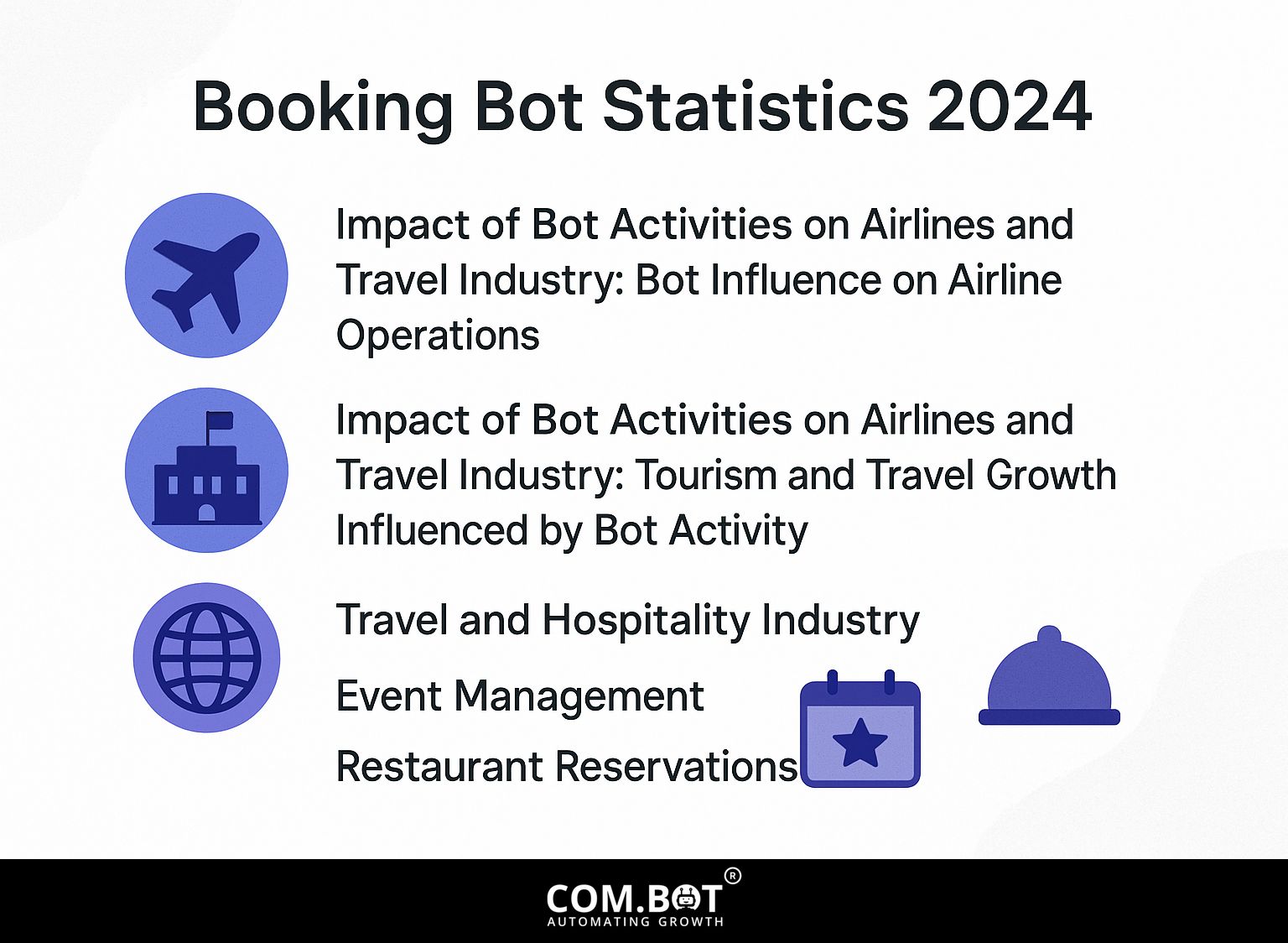
Impact of Bot Activities on Airlines and Travel Industry: Bot Influence on Airline Operations
Impact of Bot Activities on Airlines and Travel Industry: Tourism and Travel Growth Influenced by Bot Activity
The Booking Bot Statistics 2024 highlights the significant impact of bot activities on the airline and travel industry. Bots, especially those created by GeeTest, are changing how things are done and helping businesses grow by taking over repetitive tasks and improving how users interact with services.
Impact of Bot Activities on Airlines and Travel Industry reveals the considerable influence of bots across sectors. GeeTest has achieved a 50% market share in the airline sector, indicating its role in improving operational efficiency, enhancing security, and streamlining customer interactions. Furthermore, GeeTest holds a 56.4% market share across key industries This shows how it works well in different areas, such as travel.
- Tourism and Travel Growth Influenced by Bot Activity: The data indicates substantial growth fueled by bot activities in tourism and travel. There is a notable 68% year-over-year increase in hotel bookings in non-first-tier cities, demonstrating bots’ ability to target emerging markets and facilitate localized tourism growth.
- The 151% increase in scenic spot ticket orders shows how bots help manage reservations quickly and improve access to attractions. Bots are probably boosting ticket availability and making buying easier.
- Additionally, the 130% rise in inbound travel bookings demonstrates bots’ ability to handle international bookings and help travelers with complicated travel plans, which increases global tourism.
The use of booking bots is changing the airline and travel industry by making operations more efficient, improving experiences for users, and encouraging growth in markets that are usually less served. The large market share of GeeTest in various industries shows how important bots are for reaching these goals. As technology continues to evolve, the role of bots will likely expand further, offering new opportunities for growth and innovation in travel and tourism.
Travel and Hospitality Industry
In the travel and hospitality industry, booking bots make hotel reservations simpler and manage customer questions, leading to a 30% improvement in booking efficiency.
These bots, like Zoho SalesIQ and Expedia, are created to handle different jobs for both customers and hotel employees.
Zoho SalesIQ can engage customers with real-time chat support, answering questions about availability and pricing instantly. On the other hand, Expedia’s booking system uses user data to suggest hotel options that match personal preferences, improving the customer experience.
By using these tools, hotels can cut down on manual booking tasks, letting staff concentrate on serving guests, which leads to higher customer satisfaction and loyalty.
Event Management
Booking bots in event management simplify ticket purchasing and improve customer support, reducing operational costs by up to 25%. These bots manage ticket sales, respond to common questions, and deal with customer inquiries instantly.
Eventbrite works with chatbots so people can buy tickets anytime through messaging services. By using tools like Chatfuel or ManyChat, event organizers can make experiences that fit individual preferences.
They guide users through ticket choices while gathering useful information for upcoming events. This method makes things better for attendees and lets staff focus on important work, which increases sales and happiness.
Restaurant Reservations
In the restaurant industry, bots facilitate reservations and manage customer feedback, contributing to a 15% increase in customer satisfaction ratings. Tools like OpenTable make it easier for customers to reserve tables using a simple online system.
Using platforms like FreshChat helps handle inquiries and gather feedback, allowing for quick replies to frequent questions and collecting customer opinions.
Using machines for these tasks, restaurants can cut down on staff duties and improve the dining experience. Implementing these systems can lead to quicker table turnover and improve customer loyalty, showcasing a clear return on investment.
Benefits of Implementing Bots
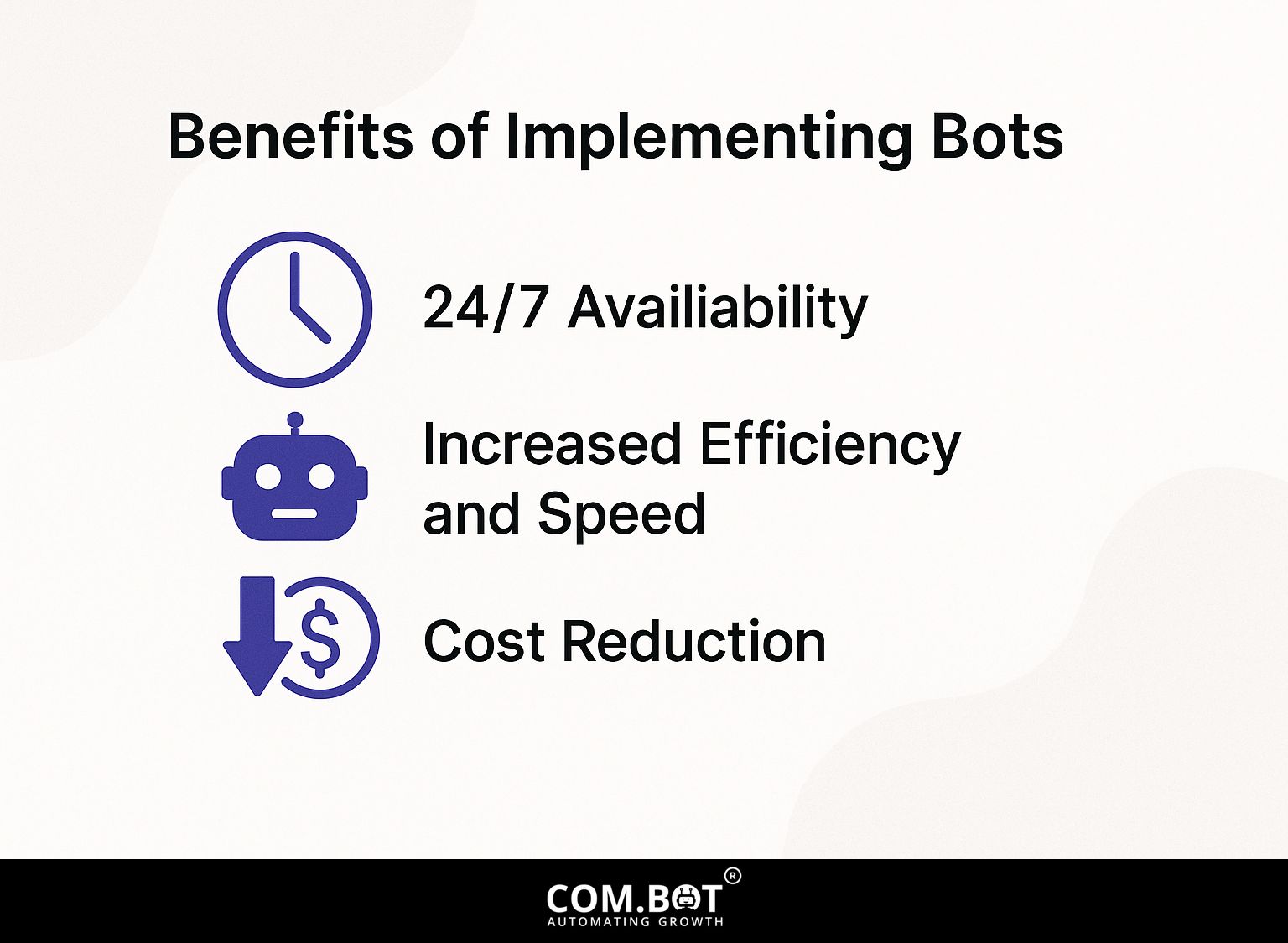
Using booking bots offers many advantages, such as being available all the time, improving how things are done, and cutting costs in operations. For instance, AI bots have shown significant benefits in enhancing customer support experiences, which can lead to higher satisfaction levels. See also: AI Bots for Customer Support: Benefits and Satisfaction.
1. 24/7 Availability
Booking bots provide 24/7 support, helping businesses respond to customer questions at any time. This results in a 40% rise in customer interaction.
For instance, travel agencies can implement chatbots like Chatfuel or ManyChat, which seamlessly connect with platforms such as Facebook Messenger.
These bots can handle bookings, provide travel updates, and answer FAQs, significantly reducing response times. Agencies using these tools say customer satisfaction has improved, with 70% of users happy with faster responses.
Examining customer interactions helps agencies improve their services, providing personalized advice that matches individual needs, making travel planning easier for clients.
2. Increased Efficiency and Speed
The use of booking bots significantly speeds up the booking process, cutting response times from minutes to seconds and improving operational efficiency by 30%.
These bots handle tasks like scheduling, sending confirmations, and processing cancellations. For instance, tools like Calendly integrate seamlessly with calendars, allowing clients to book appointments directly without back-and-forth emails.
By utilizing templates for common bookings, agents can manage multiple clients effortlessly. Chatbots can answer frequently asked questions instantly, further reducing the workload.
Studies reveal that businesses using booking bots have seen a 50% increase in customer satisfaction due to faster service, making them a good choice for improving efficiency and customer experience.
3. Cost Reduction
Businesses implementing booking bots can reduce operational costs by up to 40%, enabling funds to be redirected towards growth initiatives.
By automating scheduling and customer interactions, organizations can significantly minimize the need for administrative personnel.
For example, a restaurant can use a tool like OpenTable to manage reservations more easily. This allows staff to focus on more important tasks, such as improving customer service.
Using chatbots like Drift lets you talk to clients instantly, answering questions quickly without needing to hire more people. This change improves resource use and makes customers happier, leading to more income.
Challenges and Considerations
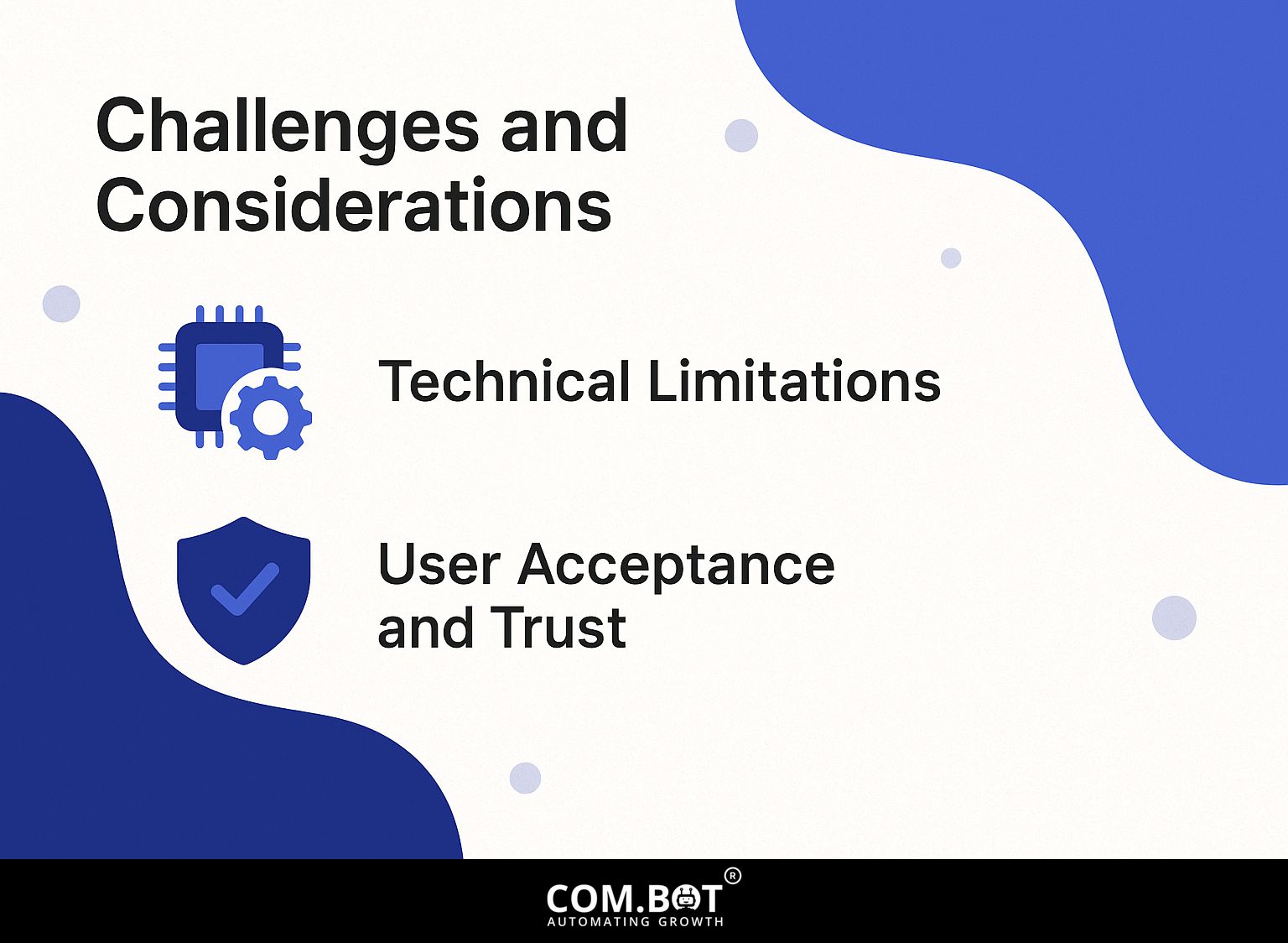
Even though they have benefits, booking bots encounter some problems that need to be fixed for them to work well and make users happy.
1. Technical Limitations
Booking bots often encounter technical limitations, including integration difficulties and data management issues, which can hinder their effectiveness. Using APIs can greatly help with combining different sets of data to tackle these problems.
For example, connecting to payment services like Stripe or PayPal allows for smooth transactions. Node.js helps bots work faster by managing events promptly. Incorporating cloud services, such as AWS Lambda, enables efficient scaling of your bot operations without server upkeep.
Employing a database like MongoDB allows for better data management, facilitating easy access and modification of booking information. By addressing these aspects, your booking bot can operate more effectively and reliably.
2. User Acceptance and Trust
Earning user trust is very important for booking bots. Studies show that 75% of people would rather interact with humans than with machines, especially during important transactions.
To make AI booking bots more user-friendly, companies can use different methods.
- Provide transparent communication about how the bot operates, including its limitations. For example, offering a seamless option to switch to a human agent can alleviate concerns.
- Create designs that are easy to use, and add personalized messages to make interactions feel unique.
- Regularly collecting user feedback can improve the bot’s performance and show that the company cares about customer experience.
Together, these methods can greatly build trust and acceptance among users.
Upcoming Developments in Booking and Reservation Bots
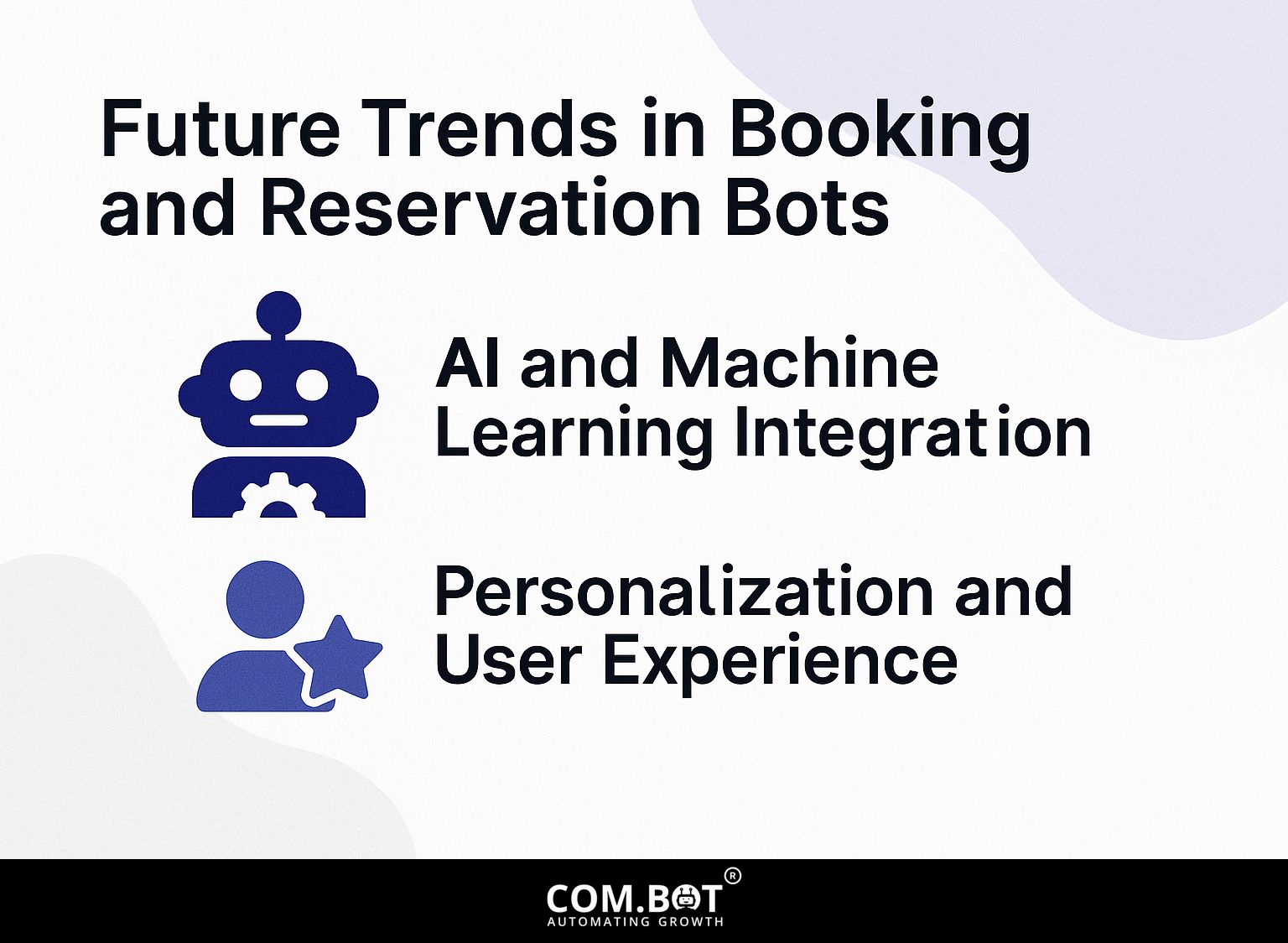
Booking and reservation bots are expected to use advanced AI to better meet individual needs, significantly changing how users engage with them. This evolution in AI capabilities is particularly evident in how AI bots enhance customer support through improved interaction and satisfaction.
1. AI and Machine Learning Integration
Using AI and machine learning in booking bots improves how they interact with customers by learning from what users do and like.
Travel agencies such as Klook and Expedia use AI-powered booking bots that review previous bookings to offer customized travel choices.
By employing tools like Dialogflow for natural language processing, these bots handle inquiries effectively and improve over time through user interactions.
Using machine learning algorithms helps these systems to forecast upcoming booking patterns, offering information that can improve marketing plans.
Using these systems improves the user experience, making it more personalized and effective, which leads to more satisfied customers who remain loyal.
2. Personalization and User Experience
Personalization is increasingly important, with 80% of consumers more likely to engage with a brand that offers customized recommendations.
To effectively implement personalization in booking bots, businesses should focus on user data collection and engagement metrics.
Begin by adding tools like Google Analytics to understand how users behave and using AI-based platforms such as Drift or Intercom to chat with customers instantly.
Segment your audience based on preferences-such as budget, travel style, or location-using CRM software like HubSpot. This approach helps us provide personalized recommendations and specific offers, leading to happier customers and more bookings.
Frequently Asked Questions
1. What are booking and reservation bots and how do they work?
Booking and reservation bots are computer programs that automatically handle booking and reservation tasks. They work by using artificial intelligence and natural language processing to understand and respond to user inquiries, allowing for a seamless and efficient booking experience.
2. What are some possible use cases for booking and reservation bots?
Booking and reservation bots can be used in a variety of industries, such as hospitality, travel, and transportation. People can use them to schedule appointments, reserve spots for events or activities, and order things or services on the internet.
3. What are the benefits of using booking and reservation bots?
Using booking and reservation bots offers many advantages, such as improving productivity and minimizing mistakes made by people. Bots are always on, respond fast, and offer suggestions customized to each user’s preferences and previous behavior.
4. Can booking and reservation bots handle complex or unique requests?
Yes, booking and reservation bots are designed to handle a wide range of requests, including complex or unique ones. They are always learning and improving their abilities through machine learning and can handle new situations and scenarios.
5. Do booking and reservation bots have the ability to handle multiple languages?
Yes, many booking and reservation bots have the ability to understand and respond in multiple languages. This allows for a more inclusive and user-friendly experience for customers from different linguistic backgrounds.
6. Can booking and reservation bots integrate with other systems and platforms?
Yes, booking and reservation bots can integrate with other systems and platforms, such as online payment systems and customer relationship management tools. This makes booking and managing data easy and smooth for businesses.
